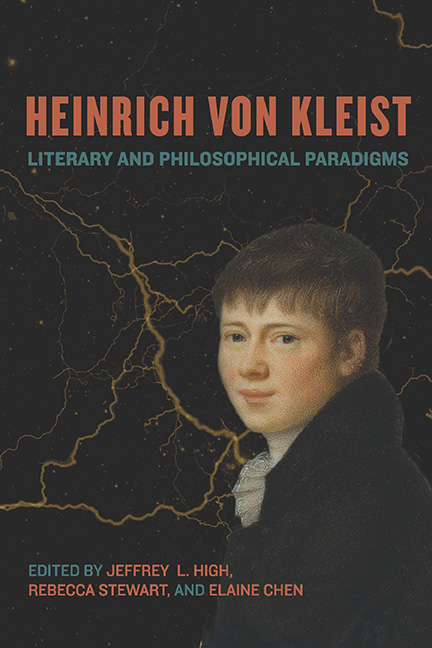2 - Just Violence? War, Law, and Politics in Kleist's Die Herrmannsschlacht Shakespeare's Henry V
Published online by Cambridge University Press: 26 May 2022
Summary
ONCE THE BLACK SHEEP of Heinrich von Kleist's (1777–1811) canon, Die Herrmannsschlacht (The Battle of Herrmann, 1808) has acquired in recent times a new critical respectability. Where postwar scholarship tended, understandably, to shy away from the play or revile it as an exercise in jingoism, successive generations of commentators have, since the late 1970s, done much to shift the tone and direction of criticism. This is not to say that the drama has been fully rehabilitated, and many continue to view it as an unfortunate outlier within Kleist’s oeuvre. There is, however, a growing consensus that the poetic force of Die Herrmannsschlacht does not exhaust itself in a blind propagandistic fury, and that the play presents a more complex set of possibilities, ambiguities, and political implications than may appear at first view.
The present chapter continues this project of—to borrow Jeffrey Sammons's term—“rethinking” Die Herrmannsschlacht. In particular, it extends a strand of recent scholarship that does not deny the play’s patriotic commitments, but which looks to draw out critical subtexts via a broader contextualization in relation to diverse sources and discourses— literary, philosophical, and political. In this spirit, the aim here is to attempt a fresh perspective on the play by bringing it into conversation with a text that has similarly pulsed with contemporaneous politics, and which has been famously read as both a celebration and a critique of patriotic attitudes—William Shakespeare's (1564–1616) late history, Henry V (1599).
“Once more unto the breach …”: Kleist and Shakespeare Revisited
To take up the topic of Kleist and Shakespeare is a daunting task. Already the famed elusiveness and inexhaustibility of both authors’ art makes comparisons challenging. There is also a copious body of critical literature on the subject with which to contend. Much of this is scattered rather than systematic—not since Meta Corssen's study from 1930 has any single volume attempted a comprehensive comparative analysis, and an update seems overdue. The omission of an entry on Shakespeare in the otherwise compendious Kleist-Handbuch strikes, moreover, as a glaring oversight. Yet the scholarship abounds with allusions to, and explorations of, Shakespeare's relevance for Kleist.
- Type
- Chapter
- Information
- Heinrich von KleistLiterary and Philosophical Paradigms, pp. 30 - 51Publisher: Boydell & BrewerPrint publication year: 2022



